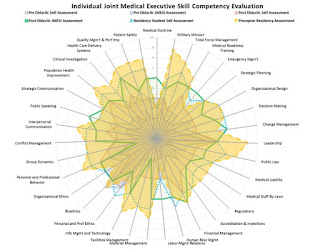Research Spotlight: Assessing Student Competency Development
This month's Research Spotlight shines on work from our very own, Dr. Brad Beauvais, published in the most recent issue of the Journal of Health Administration Education. In collaboration with colleagues Forest Kim, Mishaw Cuyler, Jason Richter, Lawrence Johnson, and David Mangelsdorff, Dr. Beauvais and his team share their development of a competency-based assessment methodology that was initially employed within the Army-Baylor Program in Health and Business Administration.
The methodology, referred to as the BEAR, grew in response to a shift towards competency-based education by the Commission on Accreditation for Healthcare Management (CAHME), which in turn has corresponded with an increased emphasis on competency-based education and calls by industry groups such as the American Hospital Association for health care organizations to carefully define and consider the importance of competencies across organizational positions. Beauvais and colleagues describe the development of their competency evaluation tool as a "mechanism to track student competency development" over the span of a student's progression throughout the graduate program, creating "a perpetual assessment tool with which faculty, students, and preceptors can actively evaluate competency development throughout the didactic and residency years." Competencies are evaluated repeatedly, including through pre-didactic self-assessment, faculty-led assessments upon each semester's completion, and preceptor assessment during the administrative residency. Thus, upon a student's completion of the program, the competency assessment tool "provides a comprehensive quantitative and qualitative assessment of student competency development for retrospective review by the student, preceptor, and faculty," and it also "assists faculty with better understanding the specific competencies developed and assessed within each class, which feeds curriculum and competency model development."
Both the Army-Baylor program and Trinity University's on-campus graduate program in health care administration share similar curriculum structures, with intense didactic education followed by a 12-month administrative residency at a health care organization. Through Dr. Beauvais's initiative and guidance, elements of the BEAR have already been introduced into the efforts of Trinity University's HCAD programs to track competencies. These elements have sparked increased engagement with between faculty and students as well as between preceptors and residents. As the health care management field continues to shift towards an emphasis upon competency-based education, Trinity University's HCAD programs and benefit tremendously from the work done by Dr. Beauvais and his colleagues, and most importantly, our students benefit from enhanced efforts to ensure they are as effectively prepared as possible to make a difference in their health care organizations.
Reference:
Beauvais, B., Kim, F., Cuyler, M., Richter, J., Johnson, L., & Mangelsdorff, A. D. (2016). Developing the BEAR: Assessing student competency development in graduate health management education. Journal of Health Administration Education, 33 (3), 377-392.
The methodology, referred to as the BEAR, grew in response to a shift towards competency-based education by the Commission on Accreditation for Healthcare Management (CAHME), which in turn has corresponded with an increased emphasis on competency-based education and calls by industry groups such as the American Hospital Association for health care organizations to carefully define and consider the importance of competencies across organizational positions. Beauvais and colleagues describe the development of their competency evaluation tool as a "mechanism to track student competency development" over the span of a student's progression throughout the graduate program, creating "a perpetual assessment tool with which faculty, students, and preceptors can actively evaluate competency development throughout the didactic and residency years." Competencies are evaluated repeatedly, including through pre-didactic self-assessment, faculty-led assessments upon each semester's completion, and preceptor assessment during the administrative residency. Thus, upon a student's completion of the program, the competency assessment tool "provides a comprehensive quantitative and qualitative assessment of student competency development for retrospective review by the student, preceptor, and faculty," and it also "assists faculty with better understanding the specific competencies developed and assessed within each class, which feeds curriculum and competency model development."
Both the Army-Baylor program and Trinity University's on-campus graduate program in health care administration share similar curriculum structures, with intense didactic education followed by a 12-month administrative residency at a health care organization. Through Dr. Beauvais's initiative and guidance, elements of the BEAR have already been introduced into the efforts of Trinity University's HCAD programs to track competencies. These elements have sparked increased engagement with between faculty and students as well as between preceptors and residents. As the health care management field continues to shift towards an emphasis upon competency-based education, Trinity University's HCAD programs and benefit tremendously from the work done by Dr. Beauvais and his colleagues, and most importantly, our students benefit from enhanced efforts to ensure they are as effectively prepared as possible to make a difference in their health care organizations.
Reference:
Beauvais, B., Kim, F., Cuyler, M., Richter, J., Johnson, L., & Mangelsdorff, A. D. (2016). Developing the BEAR: Assessing student competency development in graduate health management education. Journal of Health Administration Education, 33 (3), 377-392.



Comments
Post a Comment